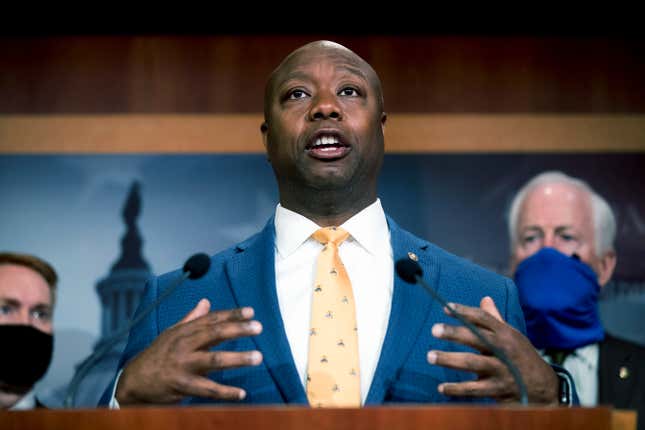
Republicans are turning to young, Black conservatives to help fill their back bench with candidates for local office who can help carry the party into the future.
CNN reported on a new effort called Run GenZ, whose aim is to grab young conservatives, train them to run for local offices, providing them with mentors the likes of Sens. Tim Scott of South Carolina and Marco Rubio of Florida and helping them build campaign infrastructures.
The report quotes several young, Black conservatives who talked about their experience being name-called and otherwise put down as they tried to convince other voters of color to pull their levers. But what their anecdotes almost always leave out is that conservative policies–such as voter suppression efforts and gerrymandering happening in red states around the country–are often antithetical to Black progress.
From CNN Politics
In 2021, Run GenZ paired Jalen Johnson, who at the time was running for city commissioner in Albany, Georgia, with Ebo Entsuah, a city councilman in Clermont, Florida, as well as Roman Garcia, who was running for city council in Kerrville, Texas, with Joel Castro, a city councilman in Alvin, Texas.
Reflecting on the pairing, Johnson said that in addition to teaching the importance of door knocking, Entsuah gave him advice on how to deal with racially charged rhetoric, such as what to do when someone asks how he can be “young and Black and a conservative.”
“People have called me names because I’m not the illustration of what they want to see in a candidate,” Entsuah said, adding that he told Johnson that while “there are a lot of days where you get heckled and people call you names,” it is necessary to “realize that you do have your residents’ and your constituents’ best interest in mind.”
Johnson, of course, has every right to his political beliefs and no candidate for office should be called out of their names because of their party affiliation. Still, recruiting young, Black candidates is off-brand alongside the party’s broader messaging. Donald Trump, who was famous for housing discrimination and advocating the death penalty for the Exonerated Five before riding a wave of racist rhetoric to the White House, is still the GOP’s biggest big homie.
Republican state legislators have spent the past decade pushing increasingly extreme tricks to keep voters, especially Black ones, away from ballot boxes. For every relatively moderate Black elected conservative (see Tim Scott, above), there appears to be two Oandace Cwens or Kim Klaciks sucking up whatever oxygen remains available Black voices on the right.
Since someone is bound to point this out: yes, Democrats come in for criticism for their inability–or unwillingness–to push through voting rights, police reform or social safety net legislation. The obvious difference is one party isn’t actively recruiting Black candidates while projecting and legislating open hostility toward those causes.
Changing course on those issues might help Johnson deal with those tough questions when he goes door-knocking.

